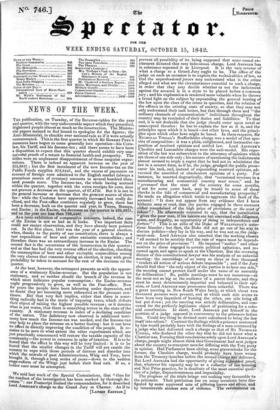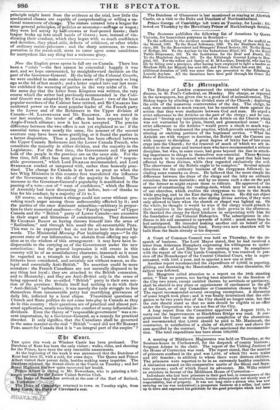We said last week of the Special Commissions, that "thus
far the conduct of the investigation has been marked by thorough de- azure " : our Postscript limited the commendation, for it described Lord ADINGER'S charge to the Grand Jury at Chester. As if to
prevent all possibility of its being supposed that some casual ex- citement dictated that very indecorous charge, Lord ABINGER has in substance repeated it at Liverpool. It is the very reverse of what a charge to a Grand Jury ought to be. The office of the judge on such an occasion is to explain the technicalities of law, so that the unprofessional jurors may understand what is the crime alleged and what are the circumstances essential to such a charge, in order that they may decide whether or not the indictment against the accused is in a state to be placed before a common jury ; and his explanation is rendered more valuable when he throws a broad light on the subject by expounding the general bearing of the law upon the class of the crime in question, and the relation of the offence to the existing state of society, so that they may not only understand their task better, but that through them and "the ordinary channels of communication" individuals throughout the country may be reminded of their duties and liabilities. To that end, it is not desirable that the judge should enter upon novel or unaccepted theories : he has to explain the law as it is, and the principles upon which it is based—not other laws, and the princi- ples upon which other laws might be based. In these respects, Sir NICHOLAS TINDAL'S Staffordshire charge was a model of that spe- cies of composition : it was a plain, enlightened, and instructive ex- position of received opinions and settled law. Lord Animas's Cheshire and Lancashire charges were the anti-model. His expo- sition of the law was subservient to the utterance of opinions which are those of one side only ; his manner of mentioning the indictments almost seemed to imply a regret that he had not to administer the law in a severer form, as if he, the judge, grudged the public prose- cutor his task, and, instead of expounding received opinions, ad- vocated the unsettled or obsolescent opinions of a party. For instance, be asserted dogmatically, that "occasional reverses in a. manufacturing and commercial country must occur," and he "presumed that the state of the country for some month; if not for some years back, may be traced to some of these checks in the tide of commercial and manufacturing prosperity.' He made an allegation which tends to aggravate the fault of the accused : "It does not appear from any evidence that I have hitherto seen or read, that the parties engaged in these excesses either complained of the high price of provisions or the want of labour"! He afterwards ventured to say, that the constitution "gives the poor man, if his talents are but exercised withAiligence, sense, and frugality, an opportunity of rising to independence and fortune" ! This is an echo of the Duke of WELLINGTON'S noto- rious blunder ; but then, the Duke did not go out of-his way to discuss politics—they lay in his way, and be was not on the judg- ment-seat. Lord ABINGEB also asserted that the working classes "all seemed to be sensible that the rate of wages must be depend- ent on the price of provisions "! He imputed " malice " and other motives to those engaged in certain political agitations, and req curred again and again to speak at the Chartists. But the crowning dictum of this constitutional lawyer was his analysis of an unlawful meeting : the assemblage of so many as three or four thousand "renders all notion of serious debate impossible " ; and if the Jury should find that "the only object of the parties is to hear one side," the meeting cannot protect itself under the name of an assembly for deliberation ! So, public meetings must be not numerous—at the most not so big as the audience of a patent theatre, and they must be most determinately impartial and balanced in their opi- nion, or Lord ABINGER may pronounce them unlawful. There was a great meeting in New South Wales lately, at which about two thousand persons were present, and at which each side seems to have been very impatient of hearing the other, one side being all but put down ; yet the meeting was strictly deliberative, and con- vened for the perfectly legitimate object of petitioning for a colo- nial constitution. In short, Lord Aninosat put himself in the position of a judge opposed in controversy to the prisoners before him. Could any thing be devised more calculated to bring the law itself into odium? Contrast the feelings which a prisoner sentenced by him would probably have with the feelings of a man sentenced by a judge who had delivered such a charge as that of Sir NICHOLAS TINDAL, who declared the other day that he did not know what a Chartist was. Forming their conclusions solely upon Lord ABINGER'S charge, people might almost think that Government had sent judges about the country to transport men for differing with the Tory party in opinion. Had Parliament been sitting, some grave rebuke for the former, the Cheshire charge, would probably have been wrung from the Treasury-benches before the second•cluirge was delivered. But Lord ABINGEB had the opportunity of giving redoubled proof, that, whatever his capacity may be as a collector of law learning and Nisi Prius practice, he is destitute of the most essential quali- ties of a judge, dispassionateness and impartiality. The progress of the trials brings out nothing very favourable to the prisoners. Their patriotism has on many occasions been dis- figured by some equivocal acts of pilfering loaves and silver, and by innumerable aimless acts of violence. The revolutionist on principle might learn from the evidence at the trial, bow little the uneducated classes are capable of comprehending or willing a na- tional manceuvre of chase. The rioters entered into a league-for some general principles, of politics or economy—suffrage or wages ; they were led astray by half-crowns or four-pound loaves ; their league broke up into small bands of rioters ; now, instead of vin- dicating their conduct, which they began with so much confidence and devotion, they plead alibi, defects of evidence, or other tricks of ordinary assize-prisoners ; and the sharp sentences, to trans- portation or the tread-mill, seem to come upon some candidates for martyrdom like any thing but a welcome glory.



























 Previous page
Previous page